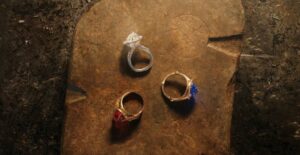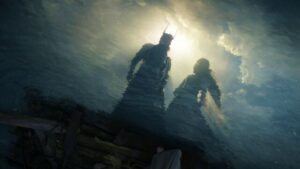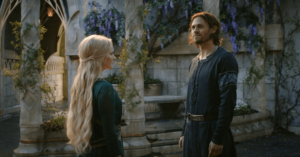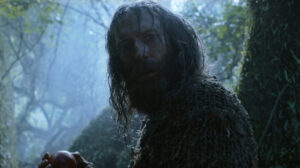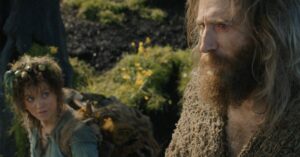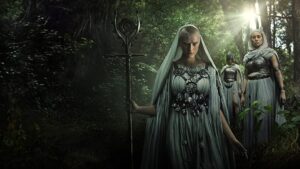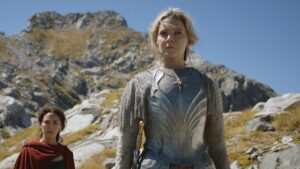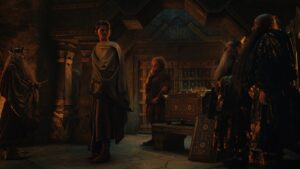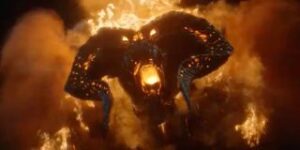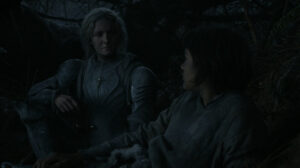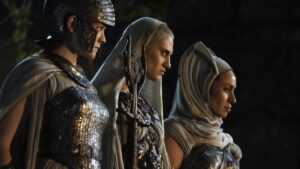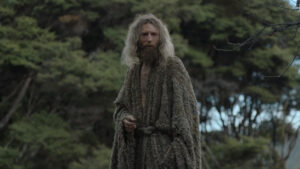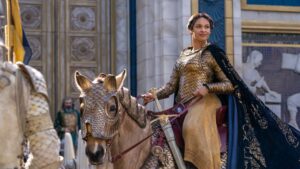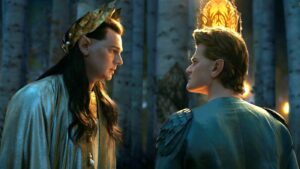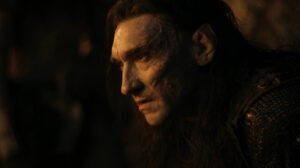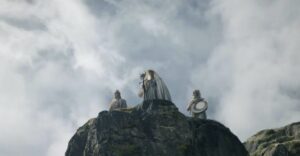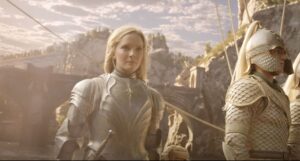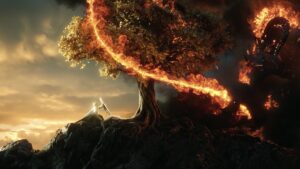MAJOR SPOILERS FOR THE RINGS OF POWER SEASON TWO, EPISODE TWO AHEAD!
Ever since it was announced that Amazon’s The Lord Of The Rings: The Rings Of Power would be adapting the events of the Second Age of J.R.R. Tolkien’s Middle-earth, fans have been waiting to hear one name – a name which never appears in the text of The Lord Of The Rings or its Appendices, but has seeped into mainstream perception of the story, by way of fan-art and fanfiction. It is a name I feared we might never hear spoken onscreen, after we learned that Amazon does not have the rights to any of the books in which it was published, including The Silmarillion and Unfinished Tales: Annatar…”Lord of Gifts” in Quenya…the name adopted by the Dark Lord Sauron (Charlie Vickers) when he went among the Elven-smiths of Eregion, disguised as an emissary of the Valar, and deceived their wisest. While the writers could have invented their own name for the character, it would have been a blow to The Rings Of Power‘s legitimacy, perhaps a fatal one.

We still don’t know exactly how Amazon goes about acquiring a name or piece of information from The Silmarillion, etc., and in the absence of official answers rumors thrive. TheOneRing.net reported in January, citing “verifiable spy reports” and some wild rumors started on 4chan, that Amazon had quietly acquired the rights to The Silmarillion, though they said the same thing before season one aired, and only a single Silmarillion and Unfinished Tales-exclusive name – that of Númenor’s capital city, Armenelos – ever popped up in the final product. In February, Fellowship Of Fans reported that Amazon had gone to the Tolkien Estate to negotiate access to specific passages from Unfinished Tales regarding the Istari. For my part, I’ve always assumed that the showrunners are so tight-lipped on this subject because they have to do a fair bit of pleading with the higher-ups at Amazon to in turn go back to the Tolkien Estate (whom they paid $250M upfront in 2017 for the rights to The Lord Of The Rings and The Hobbit, ironically the two least useful pieces of source material for the show they ended up making) and shell out more mind-boggling amounts of money in exchange for the rights to use a name like Annatar.
It’s just the name, nothing more (so far), but the name alone carries weight, and the effect of its use in an already dramatic sequence is immediate and enthralling. Sauron, having weaseled his way back into Eregion disguised as Halbrand, under the pretense of wanting to share with its lord Celebrimbor (Charles Edwards) news of the Three Rings – which he has prevented from reaching Eregion – finally secures an audience with the Elven craftsman near the end of the episode…and finds him less amenable than he had hoped to the idea of forging more Rings of Power for the race of Men. Celebrimbor is, in fact, so put off by the very notion of placing objects of such world-altering potential in the hands of “covetous” mortals that he is unwilling to treat with Halbrand further, and the Dark Lord, internally sweating bullets, has no choice but to confess that he is not a man at all. He turns to sorcery, the most advanced form of optical illusions, to convince Celebrimbor that he is in truth a beautiful blonde envoy of the Valar named Annatar in search of an artist, preferably an extremely talented Elven jewelsmith directly descended from the very greatest, capable of saving Middle-earth and its people from imminent destruction.
Annatar’s appropriation of Christian religious imagery, first speaking to Celebrimbor as a disembodied booming voice coming from his hearth and then appearing to descend from the clouds, succeeds in overawing the reverent Elven smith, and his shameless flattery certainly doesn’t hurt either. Poor Celebrimbor; he’s really not a bad guy. It wasn’t arrogance that told him to open the gates to Halbrand, it was frustration with the Elves for keeping him in the dark, and empathy for the man alongside whom he did his best work (and knows it), who tells a similar story of being disrespected and dismissed when he was no longer useful to the Elves. The Rings Of Power makes a point of showing Sauron manipulate his victims not by exploiting their vices but by turning their virtues against them – Galadriel (Morfydd Clark)’s righteous anger, Adar (Sam Hazeldine)’s love for his people, and now Celebrimbor’s kind heart. A person can resist their vices, or overcome them. But if their virtues are so thoroughly corroded that the two become confused, they will never be safe in their own skin.

Edwards, 54, may not physically resemble the image many fans had of Celebrimbor, typically portrayed as a (frankly rather generic) young, square-jawed Elf with long dark hair and broad shoulders, but the star of Britain’s National Theatre carries himself with a dignity that is thoroughly Fëanorian, perhaps most palpable in the scene where he goes to speak with Halbrand at the gates, meaning to turn him away; it is raining, and Celebrimbor is followed by attendants carrying a large and ineffective umbrella over his head, a visual that would be distracting, to the scene’s detriment, if the actor under the umbrella wasn’t unwaveringly convincing as someone worthy of the whole production, but Edwards is. Far from stoic, however, his character is downright excitable, the fast and fluttery mannerisms coaxed out of him by Sauron evoking a moth drawn instinctively to the flame that will consume it. I don’t have much to add about Vickers’ invariably alluring performance here that I didn’t already write in my review of episode one, but suffice it to say that his Sauron remains the dark heart of the season.
Sauron’s gravitational pull, irresistible even when he’s not onscreen, finally knits (most of) The Rings Of Power‘s disparate story threads into a cohesive web. The Rings themselves give him tiny fingerholds in the minds of their wearers, by way of which a shadow may creep undetected even into the golden realm of Lindon. And for Galadriel, wearing a Ring of Power risks solidifying a connection between her and the Dark Lord that was already there. During the brief time they knew each other, Sauron planted a venomous seed in her exposed heart, and Clark, transferring a bit of Saint Maud to Middle-earth, vividly conveys Galadriel’s bewildered horror, disgust and anger at having to share her body with it as it invisibly takes root. I keep coming back to the moment after she instinctively refers to Sauron as “Halbrand” in a heated argument with Gil-galad (Benjamin Walker), undermining all her efforts to prove that Sauron no longer has influence over her – the expression that momentarily contorts her face is not comprised merely of predictable regret and shame, but also shock that her tongue could betray her so, the impatient frustration that comes with knowing exactly how her slip-up will be used against her, and the feeling she refuses to confront that tells her Gil-galad is right to distrust her. Layers upon layers of emotions, communicated in a split second.
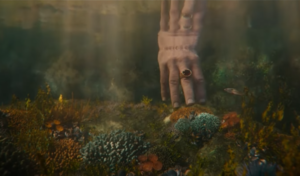
Other standouts from the cast include Robert Aramayo, playing Elrond as a battered young idealist who would rather see the Elves abandon Middle-earth than become beholden to the Rings of Power (an interesting and important counterargument to Gil-galad’s assertion that their use is justified by the dire circumstances); and the charming Ben Daniels as Círdan, whom I feel obliged to inform you all shaves with a seashell and sea-foam – but unfortunately also has to deliver some of the season’s most perplexing dialogue thus far, including drawing an inapplicable analogy between the Three Rings and the writings of the First Age poet (and notorious drunkard) Rúmil, in a monologue that’s essentially saying “separate the art from the artist, even if the art is magical objects of great power and the artist is the literal Dark Lord”. Elsewhere, The Terror‘s Ciarán Hinds makes a strong first impression in his brief appearance as the unnamed “Dark Wizard”. I speculated that he was being styled to resemble an imagined younger version of Sir Christopher Lee’s Saruman the White, and I would now like to add that if Hinds is playing Saruman, whose airs he affects, he has the potential to rank among the franchise’s greatest casting choices. I never thought I’d see the day where I’d be hoping neither nameless wizard on The Rings Of Power turns out to be a Blue Wizard, but here we are.
There is still alarmingly little to say of the other nameless wizard – Daniel Weyman’s Stranger – walking across Rhûn with only the vaguest sense of a direction, in the company of reliably endearing Harfoots Elanor “Nori” Brandyfoot (Markella Kavenagh) and Poppy Proudfellow (Megan Richards). Their subplot on the edge of the world provides the occasional moment of levity and a welcome change of scenery from the forests and mountains of western Middle-earth, but at the cost of staggering the narrative. Events in this episode result in the Stranger and Harfoots becoming separated, further dividing the story’s time and focus through episode four.
But while I would happily exchange some, most, or all of the Stranger’s scenes this season for a few more fleshing out the seduction of Celebrimbor, the subplots closest to the action in Eregion earn their keep on the show. The Rings Of Power struck gold in season one with the coupling of Owain Arthur and Sophia Nomvete, two equally boisterous and complimentary personalities, as the Dwarven prince and princess of Khazad-dûm, so it’s no surprise to see them back and leading their own storyline under the mountain. Their characters are living a bit more modestly these days (just a bit: Nomvete’s Disa still wears a robe encrusted with chunks of gold, and both her and Arthur’s Durin IV twinkle from all the gold-dust in their hair and beards) but their love for each other is unaffected, and anchors them as their kingdom literally crumbles. It’s particularly exciting to see more of Nomvete’s fire in the scenes Disa shares with her estranged father-in-law, King Durin III (Peter Mullan), and to have her extraordinary singing-voice featured again on Bear McCreary’s beautiful score.

In the episode’s final minutes, Durin and Disa receive a letter summoning them to Eregion to speak with Lord Celebrimbor – an invitation they can hardly refuse, given their present circumstances, but one that will have fateful consequences for Khazad-dûm, the Dwarves, and indeed, all of Middle-earth. Seven more Rings of Power, designed by a well-intentioned Celebrimbor with Dwarven collaboration but sullied in the making by the malicious hand of Annatar, will be brought into the world alongside the Three as a direct result of the meeting, speeding the Dark Lord’s plans along. Although he’s had to backburner his idea of forging additional Rings for Men, Sauron is already almost halfway to his goal of bringing the Free Peoples under his control and in the darkness binding them, to paraphrase the verse inscribed on the one Ring he hasn’t yet spoken of forging to anyone. And he accomplished all of this, mind you, with some hydrogen peroxide and a hair straightener. Morgoth could never.
Episode Rating: 9/10
